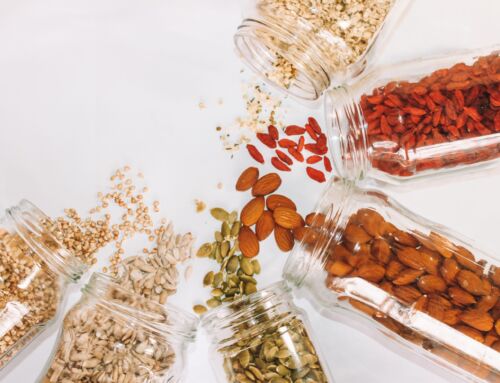Abdominal bloating is one of those symptoms that 99% of patients who visit our clinic present with. For some it’s a debilitating symptom that they can’t make sense of, for others it comes up in conversation as we check through digestive symptoms. For these people they’ve had bloating for some time but have to a degree adapted to the feeling of uncomfortable distention in their abdomen and don’t even think it worthy of mentioning until directly asked about it. For some women they associate their bloating with the luteal phase of their cycle (that is, just before they get their period) however upon further exploration we realise their bloating is present much more frequently and is actually just exacerbated with their menstrual cycle. Unfortunately, bloating is a vague symptom. For nutritionists and naturopaths who geek out over digestive health, it’s a key indicator to how the gut is actually functioning, but to the untrained eye it can be quite simply fobbed off as “IBS”, “gluten intolerance”, “lactose intolerance” or “just your hormones”. Whilst all of these simple “diagnoses” are to a degree, true, they don’t really paint the whole picture and for the person suffering with bloating, they do little to relieve their symptoms. A great example is for those told gluten is the cause of their bloating woes, they trial eliminating gluten only to find that they actually feel exactly the same but now they long for a delicious piece of sour dough….
Bloating tells a story
Bloating is different for everyone. For some it presents straight after they eat, and it doesn’t matter what food they consume, they become distended and uncomfortable. For others its a few hours later and at this point they can’t seem to work it out – was it the lunch they had two hours ago? Or perhaps it was the gym session they just did? But isn’t exercise meant to help with digestion? It’s all so confusing. And then of course there is the actual location of the bloating; upper abdomen (this is where you stomach sits)?, Middle abdomen (near your transverse colon or small intestine)? Or lower abdomen (near the distal colon, the last phase of your digestion before you have a bowel movement)? I bet you never thought there would be so much specificity when it comes to bloating. These details matter, because there is information in the detail.
When I meet with a new patient for the first time I start the appointment by saying “hey, I’m Sam a clinical nutritionist and I like to talk about periods and poo”. I get a mixed bag of responses, but most people laugh. I preface these appointments by saying this because I want to start off on the right foot. I want to get all the information relating to an individual’s digestion and it starts with them noticing how they feel on a day to day level. I want my patients to know that their bodies are speaking to them every single second (for some, their bodies are shouting at them), and a bowel movement and the symptoms surrounding it, is a daily report card.
So why is bloating so significant to a bowel movement?
Abdominal bloating happens at a critical point along the digestive tract. The digestive tract begins at the mouth and ends at the anus and is on average a whopping 30 feet in length (that’s over 9 metres for my metric friends)! That’s a huge amount of surface area to contend with. Bloating usually occurs after the consumption of food or beverages, and as I mentioned before, it can happen straight away or sometime later, however for most it is always after food is eaten. So when we talk about bloating in a consult, it is less about the symptom itself and more about the factors surrounding the symptom that give us clues. Whilst it’s impossible to give health advise relating to bloating, because bloating differs for everybody, there are some easy ways to improve digestive function that may improve bloating.
Digestion Tips
- Eat consciously – notice if you’re ready for food. Are you salivating? Is there saliva on your tongue? How’s your breathing? Is it slow and restful? These are all signs that your body is ready for food. If you notice that your mouth is dry and your breathing is rushed, stop and take a moment. A few deep breaths, feet flat on the floor. Bring your nervous system back to the present moment and then remember to chew well and eat slowly. These are the easiest things you can do to ensure the digestion of your food starts off right!
- Avoid fluids with meals – drinking fluid with meals will dilute your stomach acid and digestive enzymes and make it harder for your food to break down. Aim to drink fluid 15 minutes before or 60 minutes after meals. And if you notice you need to reach for a sip of water during a meal, check in with your nervous system and refer to the first tip, you may not have been ready for food due to an activated stress response.
- Stimulate your digestion – a small amount of apple cider vinegar (diluted in a little water) before meals is a great way to stimulate your digestive juices. Additionally, consuming bitter foods at the start of the meal such as rocket, dill, mint, artichoke, lemon and lime juice, radicchio and ginger, will also help to stimulate digestive enzymes and prepare your stomach for food.
- Eat more plants – if you think you’re eating enough plants, then I want you to double your intake now. I recommend all my patients include a diverse range of plant foods such as vegetables, fruit, nuts, seeds, legumes, beans and wholegrains and set them the task of counting at least thirty different varieties of plants in their diet per week. Our microbiome really is steering the ship when it comes to our health and they thrive on plants. Plants contain fibre, nutrients and polyphenols, all of which feed our beneficial bugs. Bloating can be a sign of dysbiosis (an imbalance of good and bad bacteria) and even when we think we are eating a healthy diet, we may be stuck in our habitual ways, consuming the same foods and not including a diverse range of plant foods to nourish the varying species in our gut. So eat your plants and eat lots of different varieties!
- Drink water – our bodies need water to survive. Our cells need water to function. And our digestive system needs water to fulfil a multitude of processes including a bowel movement. Bloating is a very common sign of constipation and dehydration is the number one cause of constipation. If you think you’re drinking enough water (approximately 2-3L daily) and you’re still constipated, I would encourage you to consider the electrolyte content of your water. Rather than hydrating you may just be flushing as most tap and filtered water contain little to no electrolytes. Electrolytes enable the flow of electrical signals throughout the body and are so important to osmotic pressure of cells… which means allowing the flow of fluids into and out of cells. You can add electrolytes back into your water by adding a pinch of good quality sea salt and you can also include herbal tea and coconut water in your daily water intake.
Bloating like most digestive symptoms are very specific to each person and require a personalised approach to treatment. If you’re suffering from bloating or any other digestive symptoms I encourage you to phone the clinic on 02 4961 4075 and chat with an experienced gut health practitioner on how to get relief from bloating. We love helping individuals restore their gut function and optimise their health.
Yours in health,
Samantha Wilson




